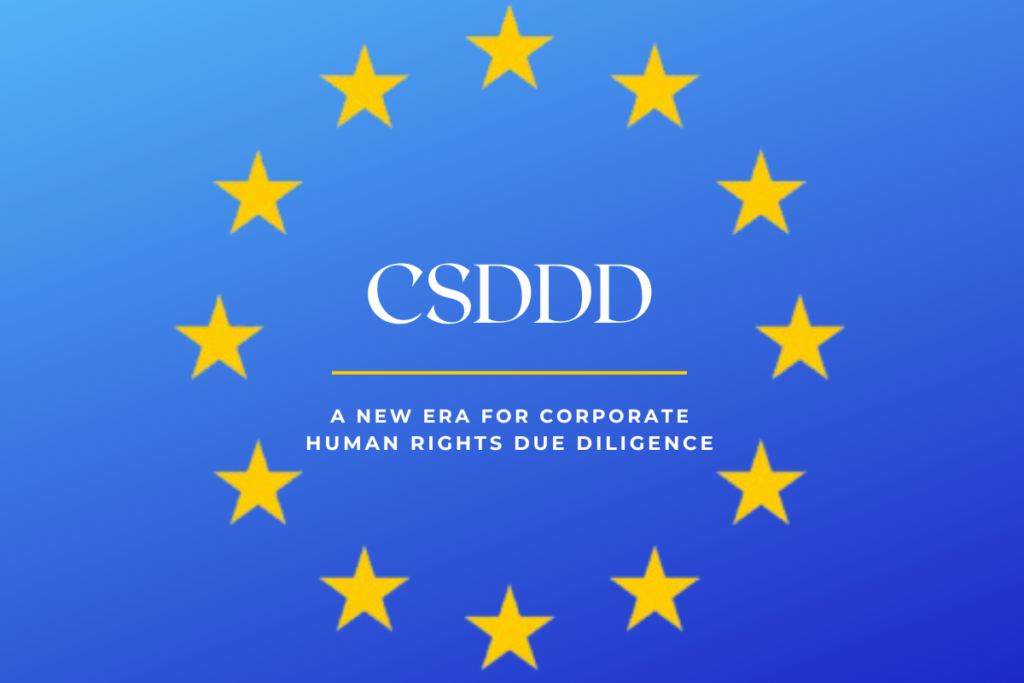For the past 14 years, I have been working on human rights due diligence. I started at a time when I was still naive enough to believe that all companies would follow the UN Guiding Principles and respect human rights. I thought all they needed was a little help—maybe from someone like me.
While I have had plenty of work over the years and have worked on great projects, including with some of the largest companies, human rights due diligence has not become a standard practice. A significant number of companies have barely engaged with it. That’s why I can hardly believe that legislation is finally coming, requiring businesses to investigate the human rights risks associated with their products and mitigate those risks—the Corporate Sustainability Due Diligence Directive (CSDDD).
Resistance still is strong, which is understandable. The requirements are not minor. If companies truly implement due diligence as prescribed by the law, it will require a massive shift.
It’s not just about acknowledging that human rights violations might be linked to their products. It’s also about making this a priority within the company, dedicating time and financial resources to addressing these risks.
Human Rights Due Diligence: A Company-Wide Responsibility
As I have seen in my work, human rights and environmental risks affect an entire company. The legislation will likely bring more involvement from compliance departments. However, they will soon realize that human rights (and let’s not forget environmental) due diligence does not fit into a simple compliance checklist. It is a continuous obligation that is never truly completed. This requires a fundamental shift in mindset.
- Human resources departments will also need to engage. Are we truly respecting the human rights of our own employees and contractors? How does diversity and inclusion relate to discrimination? Is workplace health and safety a human right? Should everyone receive maternity leave? If so, should we follow international standards rather than just local laws?
- Procurement teams will face challenges. Are we responsible for all risks in our supply chain? Surely not beyond our first-tier suppliers? How can we identify these risks? Isn’t signing a Code of Conduct enough to address them? How are our purchasing practices potentially contributing to human rights violations?
- Sales and marketing departments will have to consider their role. Should we screen our customers? Are we responsible for how our products are used? According to the UNGPs, yes—but the new law gives some leeway. For now, businesses only need to examine the effects of distribution, transport and recycling.
- And let’s not forget corporate risk management. They already assess risks, but now they must also consider risks to people and the environment—even if they don’t directly impact the company’s bottom line. This requires a different perspective. Meanwhile, corporate boards will play a crucial role, as the business model and strategy should not contribute to adverse human rights and environmental impacts.
The Scope and Timeline
For now, the CSDDD will only apply to the largest EU companies—those with over 1000 employees and an annual turnover exceeding €450 million. The financial sector has been granted an exemption, meaning banks and investment firms will not need to conduct due diligence for loans and investments.
The obligations will come into effect gradually. For the largest companies, compliance will be required in two years, while others will have up to four years. Additionally, the directive must still be transposed into national legislation.
For the majority of companies that have not yet established a proper due diligence system, this transition period provides time to develop one. For companies that are already making progress, the law ensures a level playing field. However, no company can afford to be complacent. The obligation to conduct due diligence is an ongoing effort—there is always a next step to take.
The CSDDD marks a significant turning point. It is a challenge, but also an opportunity for businesses to move beyond voluntary commitments and make human rights and sustainability a fundamental part of their operations.
